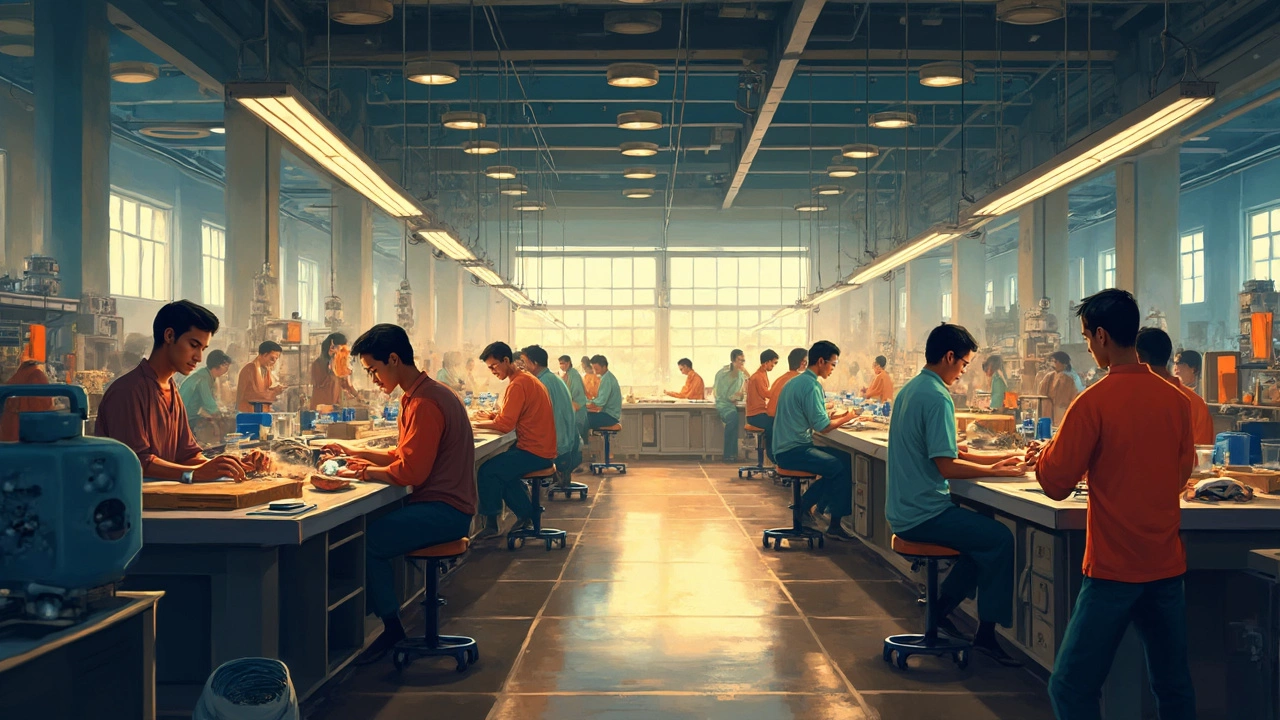 Feb, 14 2025
Feb, 14 2025
Manufacturing companies are like the backbone of our economies. They not only produce the goods we use daily but also significantly boost economic productivity. Imagine what life would be like without them? Everything from the food we eat to the gadgets we can’t live without is influenced by manufacturing.
This sector is a job powerhouse. It hires skilled and unskilled workers alike, providing opportunities for all levels of society. In fact, many towns and cities owe their prosperity to thriving manufacturing plants that provide thousands of jobs.
Manufacturing is all about making things better, faster, and more efficiently. It's about innovation that leads to new products and smarter processes. Companies in this sector are often at the forefront of technological advances, driving progress in everything from green energy to digital tech.
But there's another side to the story - government's involvement. Various schemes and policies are in place to support manufacturing. These schemes not only keep these businesses competitive but also ensure they contribute to societal well-being. Without these initiatives, many companies could struggle to survive in today’s fast-paced market.
Economic Impact
The manufacturing industry plays a major role in driving the economic engine. It's not just about churning out products; it creates a ripple effect that benefits various sectors. Let's break down how this works.
GDP Contributions
Manufacturing is a significant contributor to the Gross Domestic Product (GDP). In many developed and developing countries, it accounts for a substantial portion of economic output. The products made in this sector can be sold locally and internationally, bringing in revenues that elevate the national economy.
Investment Magnet
A thriving manufacturing sector attracts investments from both local and international investors. This inflow of capital often leads to improved infrastructure, like better transport systems, which in turn benefits the community by making services and goods more accessible.
Local Development
On a local level, manufacturing plants often become economic lifelines for communities. They support small businesses like suppliers and service providers in the area, which helps cultivate a thriving business ecosystem.
Global Trade Influence
Manufacturing companies are not just local players; they're significant contributors to global trade. Countries with strong manufacturing sectors often have an edge in international markets, which can help balance trade deficits and strengthen foreign relationships.
Emerging Technologies
The industry is also vital for integrating emerging technologies. Advances in tech like AI and IoT have found their way into manufacturing processes, leading to smarter, more efficient production. This innovation not only reduces costs but often results in better products.
In essence, the economic impact of manufacturing is vast and far-reaching. It's like the heartbeat of an economy—keeping everything else moving.
Job Creation
When we talk about job creation in the manufacturing sector, it's basically a ripple effect. A single manufacturing company doesn't just create jobs within its walls; it sends waves of employment opportunities across communities. As of 2023, in countries like the United States, about 8.1% of the workforce is directly employed in manufacturing, but there's more than meets the eye.
This sector generates a wide variety of jobs, ranging from assembly line workers to cutting-edge engineers. Job roles are diverse, meaning there's something for everyone, regardless of education or skill level. It's like an ecosystem, complete with entry-level positions and high-tech roles.
Broadening Workforce Opportunities
One of the coolest things about manufacturing is its ability to level the playing field. Companies don’t just hire engineers or machine operators. They need admin support, HR specialists, and marketing pros too. This diversity opens doors for many who might not fit the typical job mold.
- Entry-level positions: Ideal for newcomers or those without advanced education.
- Skilled trades: Opportunities for specialized roles like welding, machining.
- Professional roles: Engineers, designers, and project managers keep production innovative and efficient.
Multiplier Effect
Here's a fun fact: the National Association of Manufacturers says for every one job in manufacturing, six more are created in other sectors! Think of suppliers who provide raw materials, transportation companies that move goods, and retail outlets that sell end-products. It’s a vast network that fuels employment beyond the factory floor.
Opportunities for Growth
Jobs in manufacturing aren’t stagnant. Many companies offer training and development programs, allowing workers to advance their careers. For many, it’s not just a job; it’s the start of a career journey. Companies invest in their employees, helping them climb the ladder from a basic role to management or specialized positions.
Bottom line: manufacturing doesn’t just sustain communities; it helps them thrive. Every factory built is a beacon of opportunity, drawing in talent and boosting local economies.

Innovation and Development
The manufacturing industry is more than just about producing goods. It's a hotbed for innovation and technological advancement. Companies in this space are constantly pushing the envelope to improve processes and products.
Technological Advancements
Manufacturing has been transformed by technology in the last few decades. Think about automation and robotics; these have totally reshaped the way products are made, increasing efficiency and reducing costs. Many factories now operate with minimal human intervention, letting machines handle the repetitive tasks.
The rise of 3D printing has been another game-changer. It allows for rapid prototyping and customization that was just not possible before. This tech has shortened the product development cycle and is providing the ability to create complex designs with ease.
Sustainable Practices
In the quest for innovation, many companies are also focusing on sustainability. With growing concerns over climate change, there's an emphasis on reducing waste and energy use. Some manufacturing giants are leading the way by using renewable energy sources and minimizing carbon footprints.
They’re switching to eco-friendly materials and developing green products, which not only cater to environmentally conscious consumers but also pave the way for a healthier planet.
Collaboration and Research
Many firms are collaborating with universities and research institutions to stay on the cutting edge of innovation. These partnerships often lead to breakthroughs in new materials and manufacturing techniques that benefit not just the individual company, but the industry as a whole.
Here’s a quick look at how some companies are advancing in innovation:
| Company | Innovation | Impact |
|---|---|---|
| Tesla | Battery Technology | Reduced reliance on fossil fuels |
| GE | Industrial Internet | Increased operational efficiency |
| Siemens | Smart Grids | Optimized energy use |
As you can see, innovation in manufacturing is crucial not just for economic growth but for addressing global challenges. It’s a space where technology meets practical application, constantly evolving to meet the demands of tomorrow.
Role of Government Schemes
Government schemes are like fuel for the engine of the manufacturing sector. They can make a huge difference in how thriving or struggling an industry is. It's not just about throwing money at a problem either; it's about smart policy making that actually helps businesses hit the ground running.
One big area where the government steps in is financial support. This often comes in the form of grants and loans aimed at helping companies scale up their operations. Take the 'Manufacturing Extension Program' for instance, which provides technical support to help small and medium-sized enterprises (SMEs) stay competitive.
Encouraging Innovation
A lot of the coolest advances in manufacturing have been driven by policies that encourage innovation. Through R&D tax credits and innovation hubs, governments want factories not only to keep up with the times but to be ahead of the curve. This is crucial for maintaining a global edge, especially in high-tech manufacturing sectors.
Environmental Impact
Reducing the carbon footprint is a priority, and government schemes often include incentives for adopting greener production practices. Eco-friendly technologies and sustainable manufacturing processes are heavily encouraged and sometimes even mandated through environmental regulations.
In countries like China, the 'Made in China 2025' plan seeks to upgrade the manufacturing sector both in terms of technology and energy efficiency, making it less of an environmental burden.
Skills Training
And let's not forget about skill development. Training programs funded by the government are critical. They help workers adapt to new technologies and manufacturing methods. This ensures that people have the expertise needed for modern industry roles, which benefits both employees and employers.
The role of government in manufacturing is multifaceted, providing the support structure required for a vibrant and globally competitive industry. Without these schemes, the sector could find itself crippled by challenges such as outdated technologies, a labor force lacking modern skills, and fierce international competition.